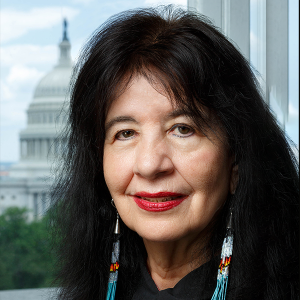Joy Harjo, the 23rd Poet Laureate of the United States, is a member of the Mvskoke Nation and belongs to Oce Vpofv (Hickory Ground). She is only the second poet to be appointed a third term as U.S. Poet Laureate. Born in Tulsa, Oklahoma, she left home to attend high school at the innovative Institute of American Indian Arts, which was then a Bureau of Indian Affairs school. Harjo began writing poetry as a member of the University of New Mexico’s Native student organization, the Kiva Club, in response to Native empowerment movements. She went on to earn her MFA at the Iowa Writers’ Workshop and teach English, Creative Writing, and American Indian Studies at University of California-Los Angeles, University of New Mexico, University of Arizona, Arizona State, University of Illinois, University of Colorado, University of Hawai’i, Institute of American Indian Arts, and University of Tennessee, while performing music and poetry nationally and internationally. Harjo is the author of nine books of poetry, including her most recent, the highly acclaimed An American Sunrise (2019), which was a 2020 Oklahoma Book Award Winner; Conflict Resolution for Holy Beings (2015), which was shortlisted for the Griffin Prize and named a Notable Book of the Year by the American Library Association; and In Mad Love and War (1990), which received an American Book Award and the Delmore Schwartz Memorial Award. Her first memoir, Crazy Brave, was awarded the PEN USA Literary Award in Creative Non Fiction and the American Book Award, and her second, Poet Warrior: A Memoir, is forthcoming from W.W. Norton in Fall 2021. Harjo’s awards for poetry include the Ruth Lily Prize for Lifetime Achievement from the Poetry Foundation, the Academy of American Poets Wallace Stevens Award, the New Mexico Governor’s Award for Excellence in the Arts, two NEA fellowships, and a Guggenheim Fellowship among others. Her poetry will be included on a plaque on LUCY, a NASA spacecraft launching in Fall 2021 and the first reconnaissance of the Jupiter Trojans. Harjo performs with her saxophone and flutes, solo and with her band, the Arrow Dynamics Band, and previously with Joy Harjo and Poetic Justice. Harjo has produced seven award-winning music albums including Winding Through the Milky Way, for which she was awarded a NAMMY for Best Female Artist of the year. In addition to serving as a three-term U.S. Poet Laureate, Harjo is a chancellor of the Academy of American Poets, holds a Tulsa Artist Fellowship, directs For Girls Becoming, an arts mentorship program for young Mvskoke women, and is a founding board member and Chair of the Native Arts and Cultures Foundation. She has recently been inducted into the American Academy of Arts and Letters, the American Philosophical Society, the National Native American Hall of Fame, and the National Woman’s Hall of Fame. Source

